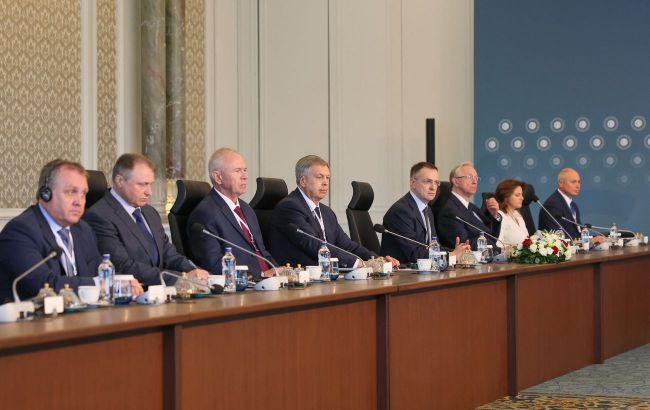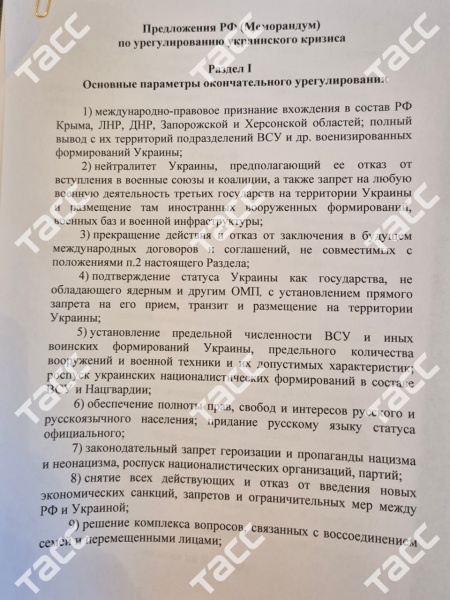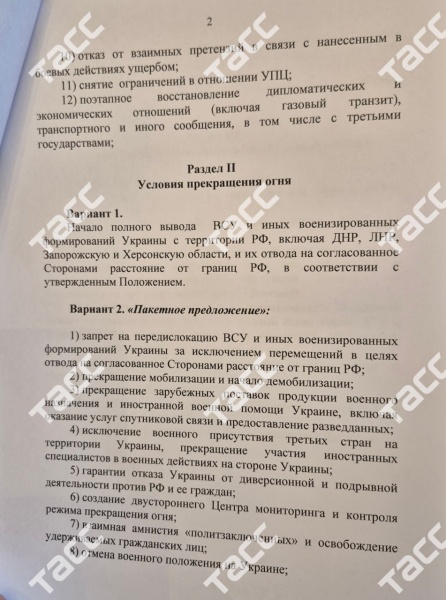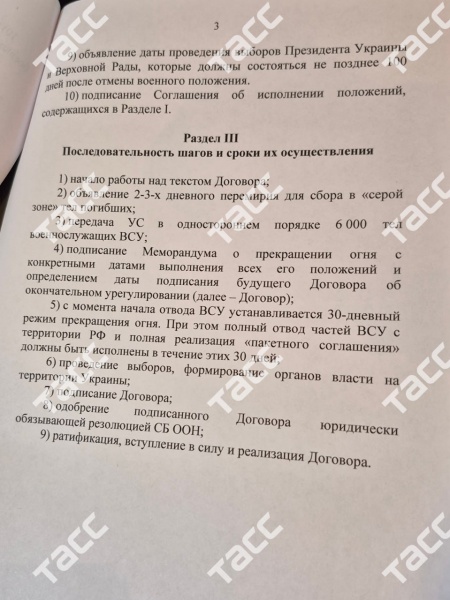Renunciation of territories and neutrality: Media reveals full text of Russia’s memorandum
 Photo: Media published the full text of the memorandum from the Russian delegation (Getty Images)
Photo: Media published the full text of the memorandum from the Russian delegation (Getty Images)
The Russian Federation, in its version of the peace memorandum, has issued Ukraine with ultimatum demands, including the renunciation of territories, even those not occupied by the Russian army, according to the full text of the document published by the Russian state agency TASS.
The document that the Russian side handed over to the Ukrainian delegation in Istanbul includes three sections with two options for a ceasefire and 31 points.
The first ceasefire option: a complete withdrawal of the Ukrainian Armed Forces from Russia, as well as from the entire territory of Donetsk, Luhansk, Kherson, and Zaporizhzhia regions. This is to be carried out within 30 days of the ceasefire.
The second ceasefire option: a ban on the redeployment of the Ukrainian Armed Forces, along with a prohibition on mobilization in Ukraine, the announcement of demobilization, and the cancellation of martial law. It also includes the cessation of military aid to Ukraine from allies and the exclusion of the presence of third-country military forces on Ukrainian territory.



Under the second option, Ukraine must promise not to carry out sabotage against Russia. It also provides for the creation of a joint center to monitor the ceasefire and mutual amnesty for political prisoners and detained civilians.
Additionally, Ukraine must announce presidential and parliamentary elections, which are to take place no later than 100 days after the cancellation of martial law. And the final point is the signing of a peace agreement.
According to the Russian version, this peace agreement should include:
-
International recognition of Donetsk, Luhansk, Kherson, and Zaporizhzhia regions, as well as Crimea, as Russian territories, along with the withdrawal of Ukrainian Armed Forces from the entire territory of these regions.
-
Ukraine’s neutrality which implies its renunciation of joining military alliances and coalitions.
-
A ban on any military activity by third countries on Ukrainian territory and the prohibition of foreign armed formations, military bases, and military infrastructure on its soil.
-
The termination of and refusal to enter into future international treaties and agreements incompatible with the neutrality provisions.
-
Confirmation of Ukraine’s non-nuclear status, with a direct ban on hosting, transit, or deployment of nuclear weapons.
-
Establishment of a maximum number for the Ukrainian Armed Forces and other military formations, along with the disbandment of Ukrainian "nationalist formations" within the Armed Forces and the National Guard.
-
Guaranteeing full rights, freedoms, and interests of the Russian and Russian-speaking population, and granting the Russian language official status.
-
Legislative prohibition of the glorification and propaganda of Nazism and neo-Nazism, and the dissolution of nationalist organizations and parties.
-
Lifting all current economic sanctions and refusing to impose new ones, including bans and restrictive measures between Russia and Ukraine.
-
Resolution of issues related to family reunification and displaced persons.
The Russian memorandum also outlines the sequence for its implementation. For example, work on the text is to begin first, followed by a planned 2–3 day ceasefire to recover the bodies of the deceased. Next comes the signing of the memorandum with specific dates, but the 30-day ceasefire will only start after the withdrawal of the Ukrainian Armed Forces begins.
The next step in the plan, according to the Russians, is to hold elections, after which they want to sign the peace agreement. This agreement is then to be approved by the UN Security Council. Only after that, according to the Russian version, will it be ratified and come into effect.
Peace negotiations in Istanbul
Today, June 2, the second round of peace negotiations between Ukraine and Russia took place in Türkiye. Both sides were supposed to present their versions of peace memorandums before the talks, but the Russians handed their document to the Ukrainian delegation only today.
President Volodymyr Zelensky stated that he has not yet seen the Russian document but has an idea of its contents based on intelligence from foreign partners. According to him, the Russian document resembles ultimatum demands.
For full details of the second round of negotiations in Istanbul, read the material.

